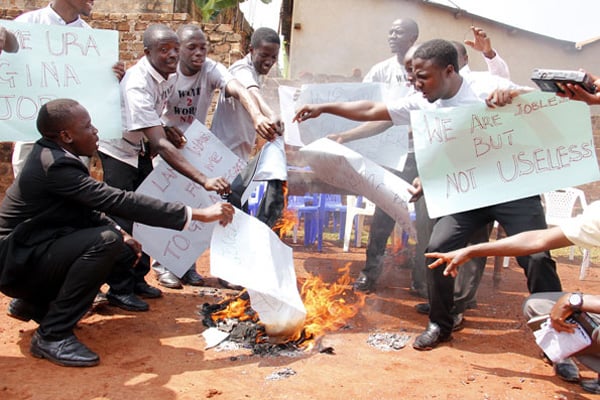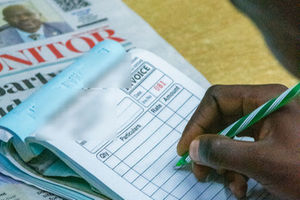
In this file photo, members of National Association of the Unemployed burning placards after addressing journalists in Kampala in 2014. There is an army of mostly young Ugandans who are effectively unemployed. WB data shows that among youth, three out of five work in unpaid occupations, contributing to household enterprises. FILE PHOTO
Youth unemployment remains a serious challenge in Uganda, with 41 percent young people unemployed as per the Uganda Bureau of Statistics (Ubos) National Labour Force Survey 2021 report.
According to the survey, 9.3 million youth are neither in education, employment, or receiving training.
As the country celebrates World Labour Day, Ms Esther Davina Anyakun, the State minister for Labour, Employment, and Industrial Relations, explains in an interview that they are running the apprenticeship programme.
READ: Busy but unemployed
Under the programme, graduates and non-graduates are placed in workplaces to get hands-on job training and experience, to equip them with skills needed in the job market.
“At the moment, we have more than 200 people undergoing training and are being supported by an organisation called Enabel, our partners,” the minister said.
“The ministry also has other initiatives, for example, supporting the Juakalis enterprises in transitioning into the formal economy programme. As of now, we have successfully supported the 17,015 Juakalis, of which 7,106 are male and 9,174 are females,” she said.
Ms Anyakun said the majority of the Juakalis are demonstrating consistent growth, indicating effectiveness in the programme.
“We also have in the ministry a programme of growth funded by the World Bank where we are expecting to support more than 60,000 women who own enterprises. We are giving them between Shs4 million and Shs200 million at the interest of only 10 percent per annum,” she said.
She said other options to absorb Uganda’s big unemployed labour force include externalisation of labour where the ministry is in talks with several other countries to allow more Ugandans move abroad for work.
“The ministry has already signed some bilateral agreements with Saudi Arabia, Qatar, Jordan, and the United Arab Emirates, and there are ongoing negotiations in Oman, where I went to last week to and United Kingdom, Germany, Israel, and Canada, which are ongoing,” she said.
She said her ministry is also drafting the Uganda National Employment Strategy, which will diagnose challenges in the labour force and provide strategies directed to create employment and ensure occupational safety of workers.
Mr Aggrey Kibenge, the permanent secretary in the Ministry of Gender Labour and Social Development, highlights that the government has lined up several measures ranging from policies to different government programmes to empower the youth.
Mr Kibenge outlines some of the programmes in the education sector where the government has put more emphasis on USE, UPE and promotion of sciences, vocational training, and skilling.
Programmes
Mr Kibenge also hints at other programmes that include the Parish Development Model to boost productivity, agricultural production, agro-businesses, and value addition, among others.
“If we invest Shs100m in every parish every year for five years, in the fifth year you have each parish in this country with Shs500m working capital that is revolving in each parish,” he said.
Mr Kibenge observes that the government in partnership with the World Bank has started another programme, Gender Equality in a Low Carbon World (GLOW), where to help women entrepreneurs access money and grow their businesses.
The Minister for Youth and Children, Mr Balaam Barugahara, said the root cause of unemployment lies in the mindset of the youth who misuse funds given to them by the government to develop themselves.
“The youth spend that money on reckless social life, going for marriage and it ends up not serving its intended purposes,” Mr Barugahara said.








